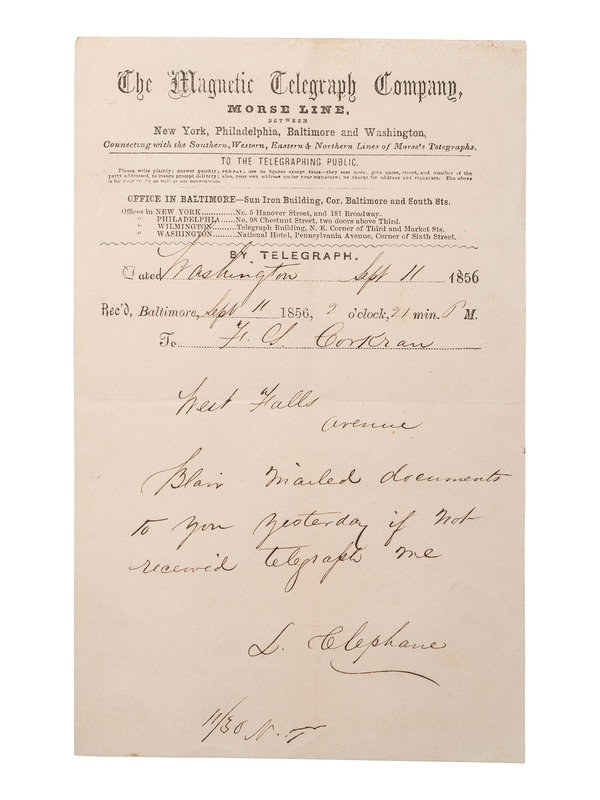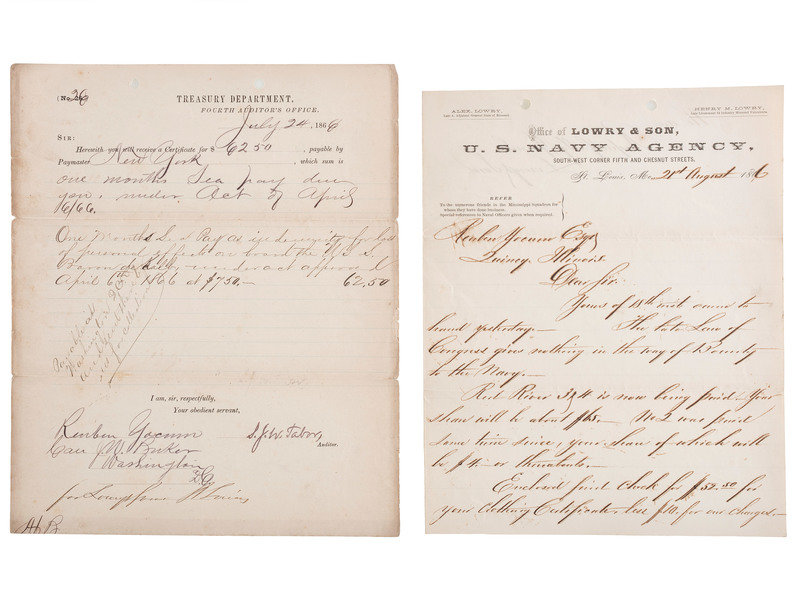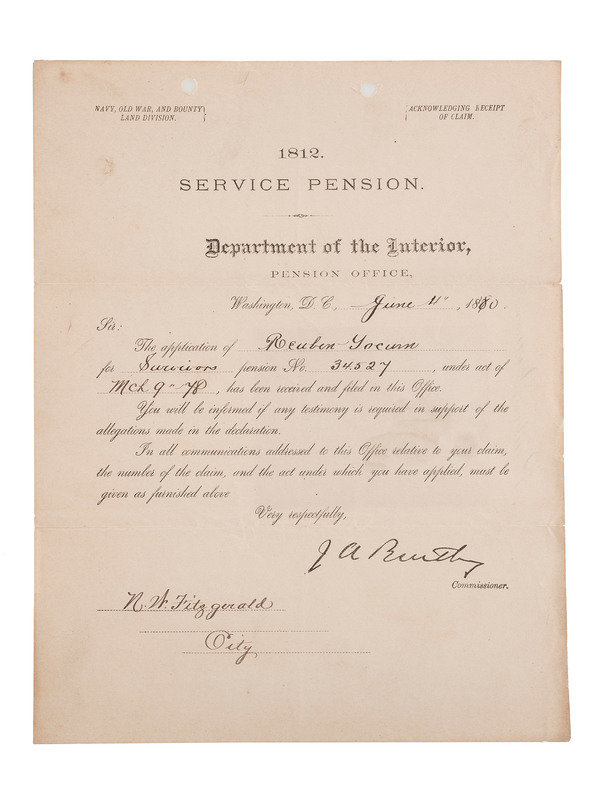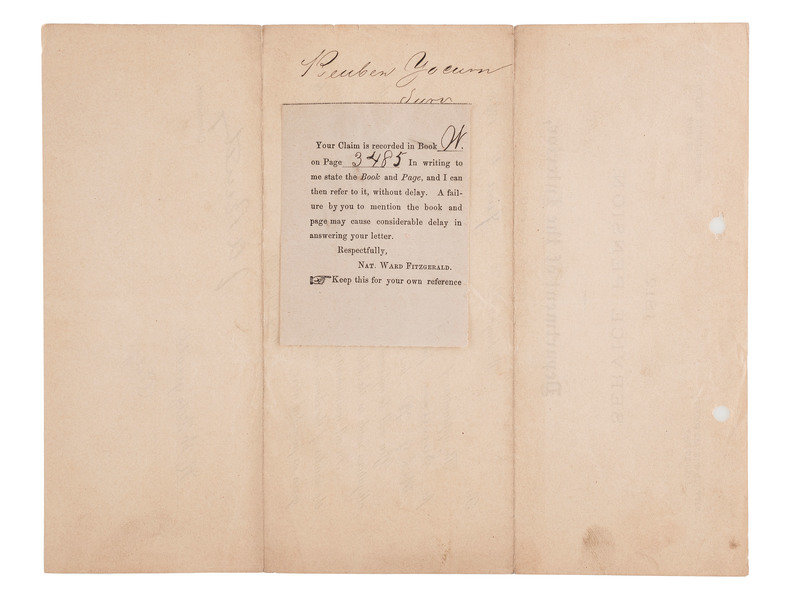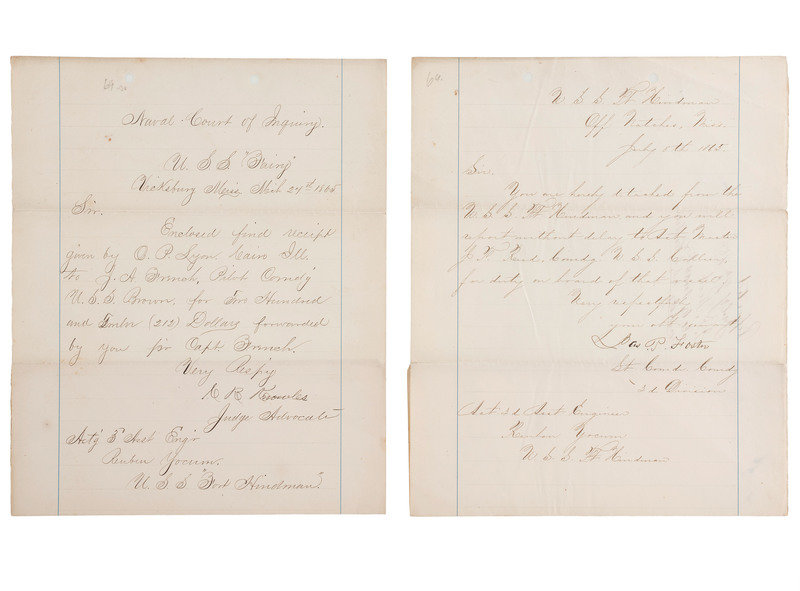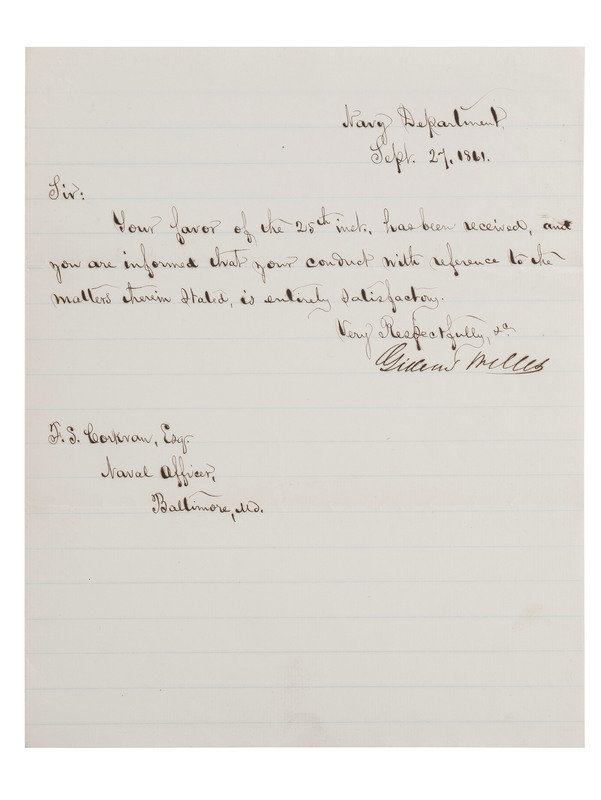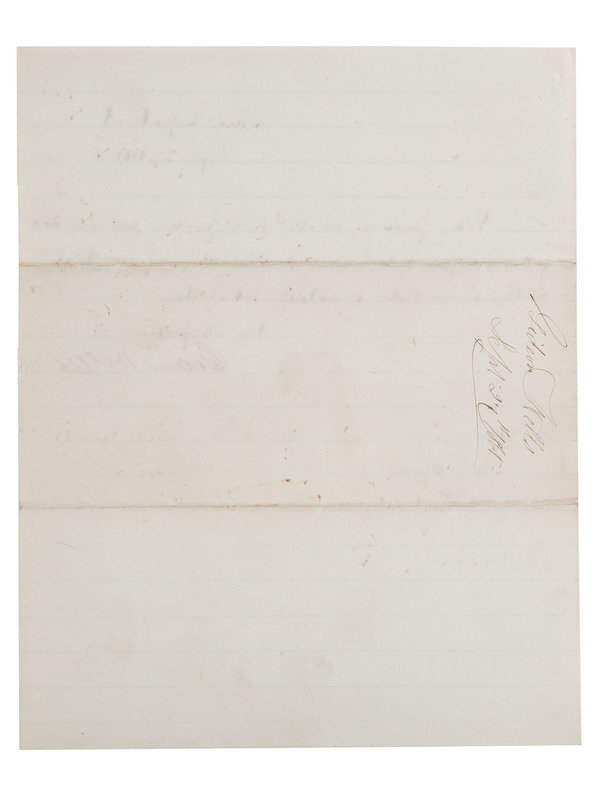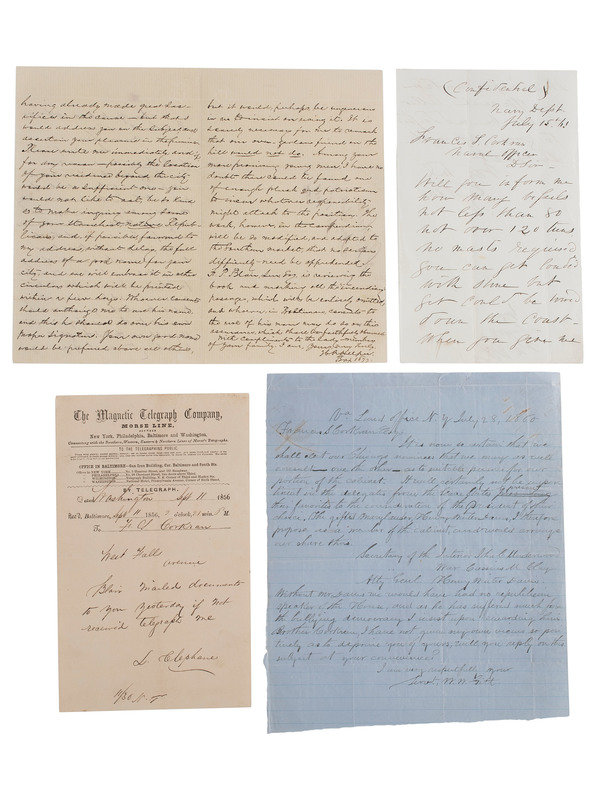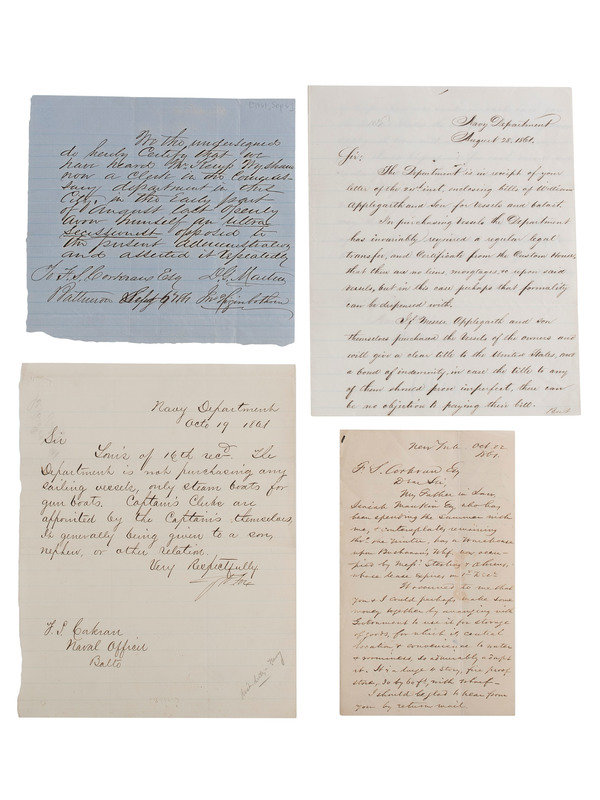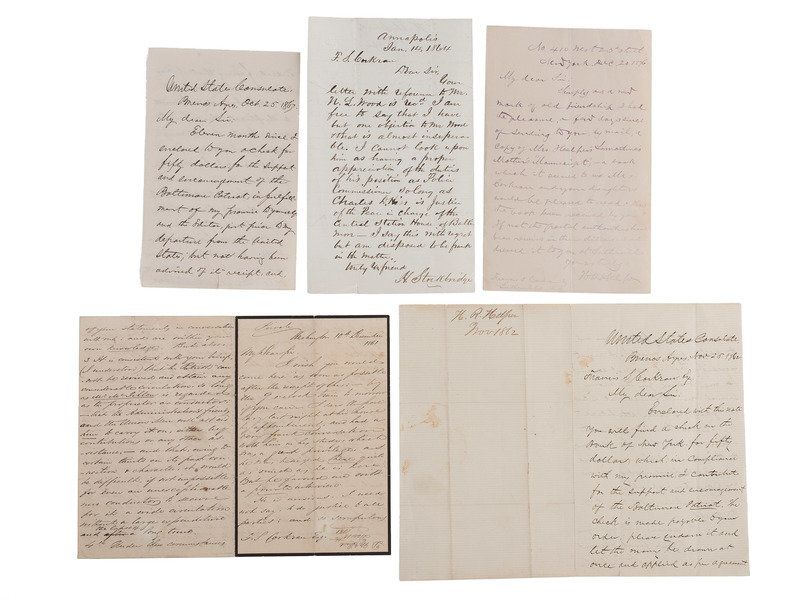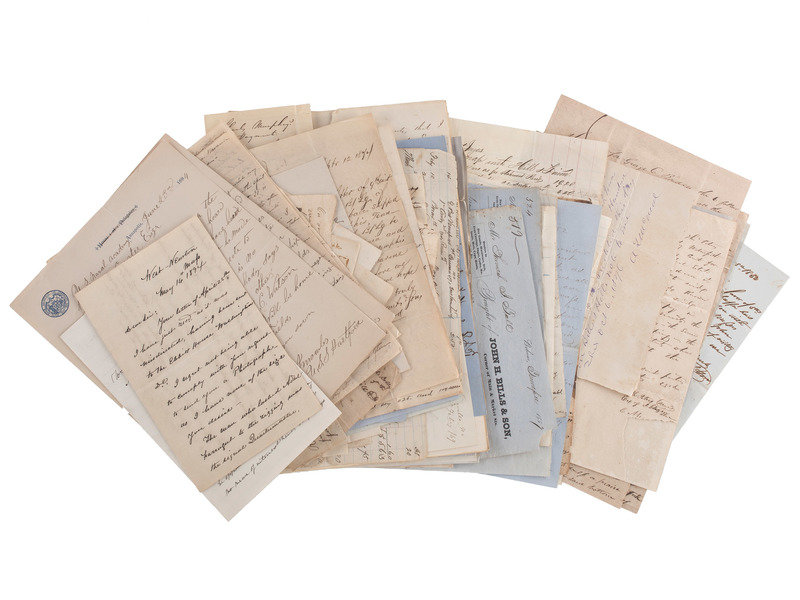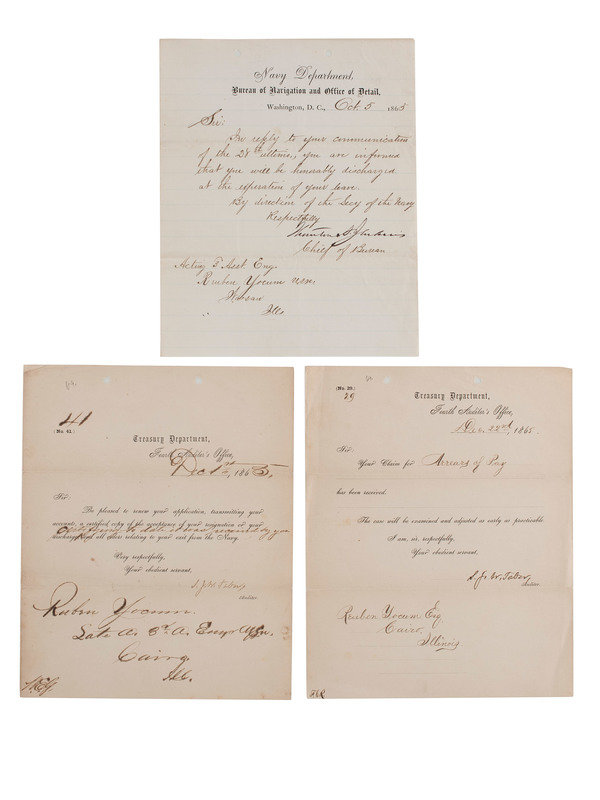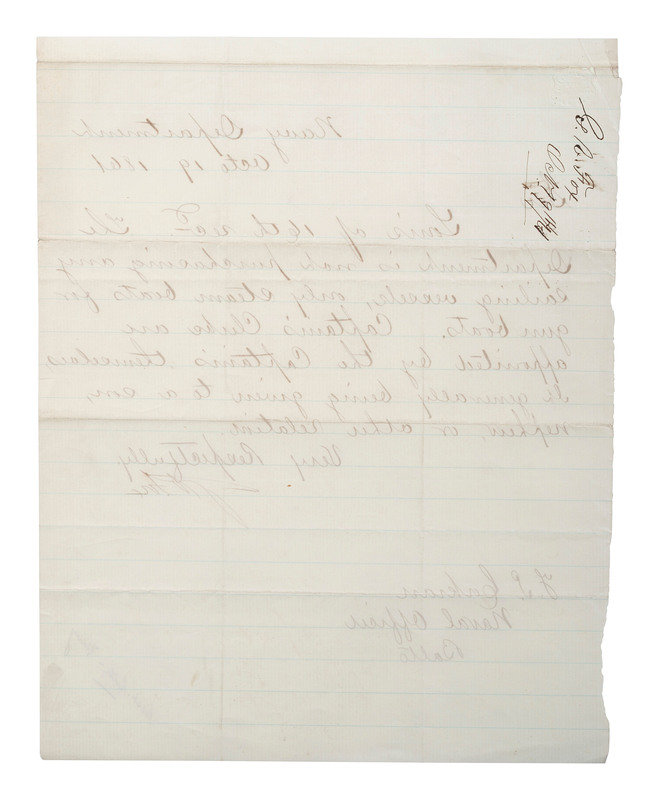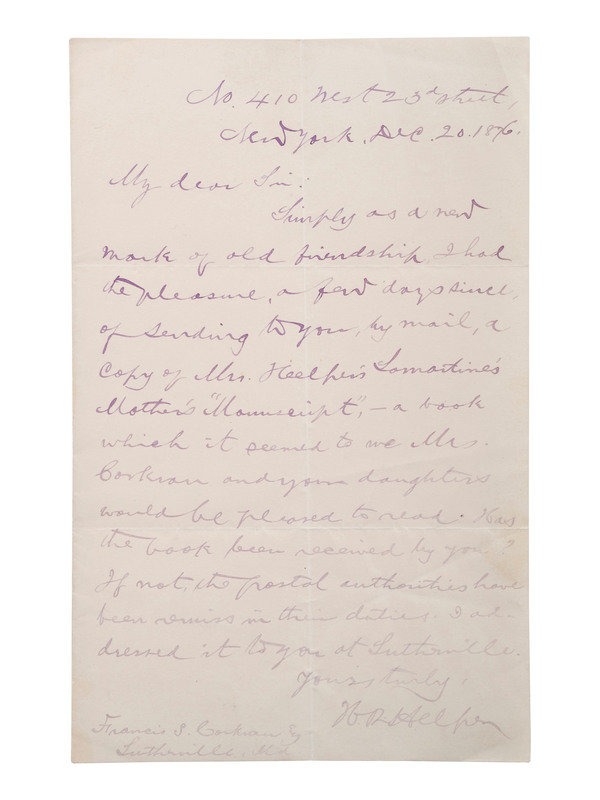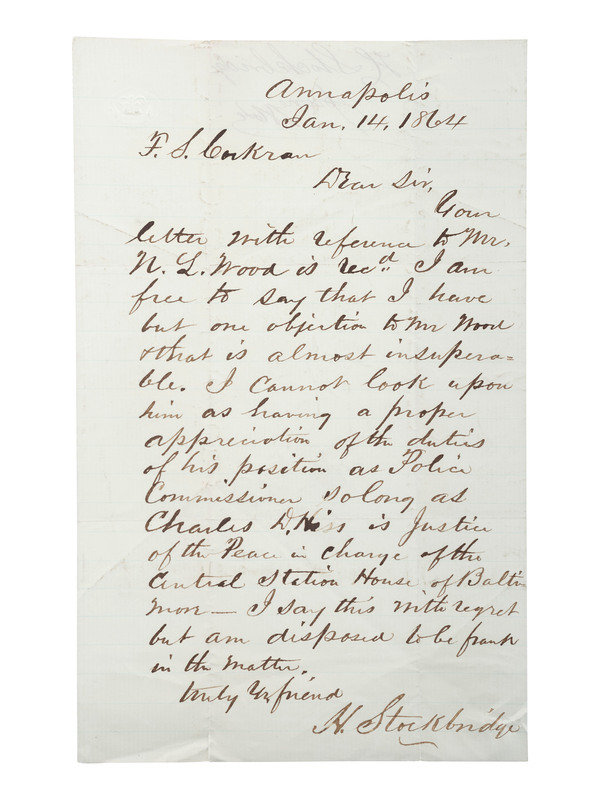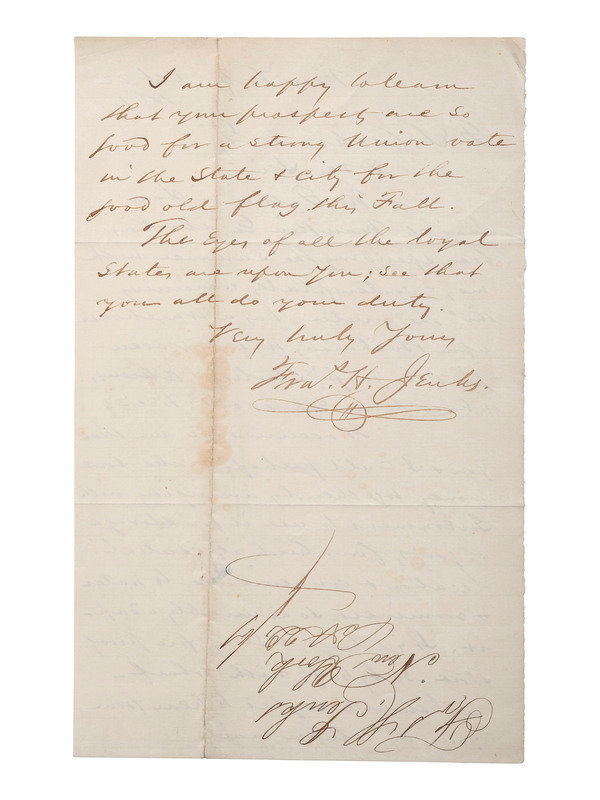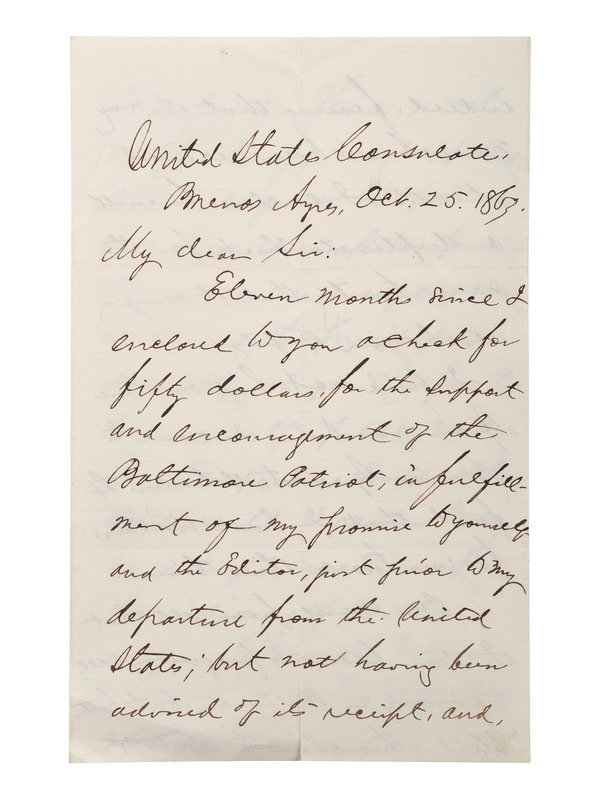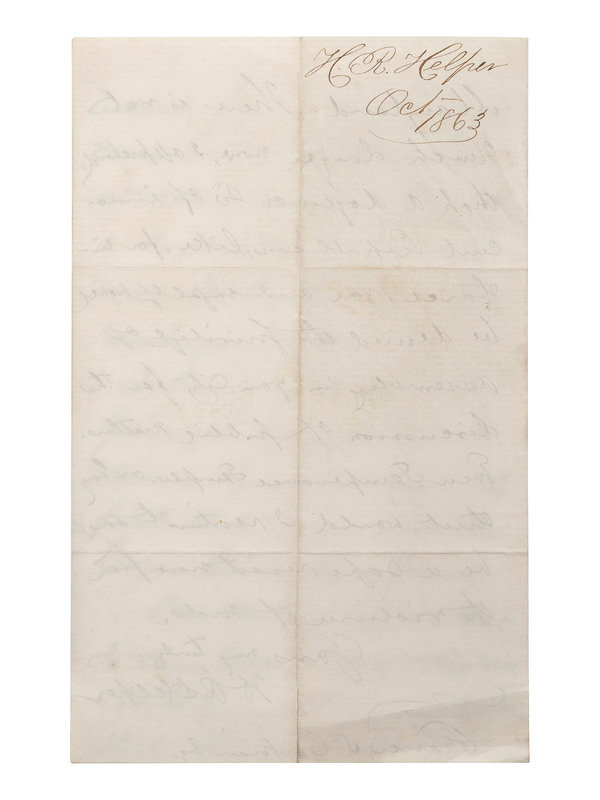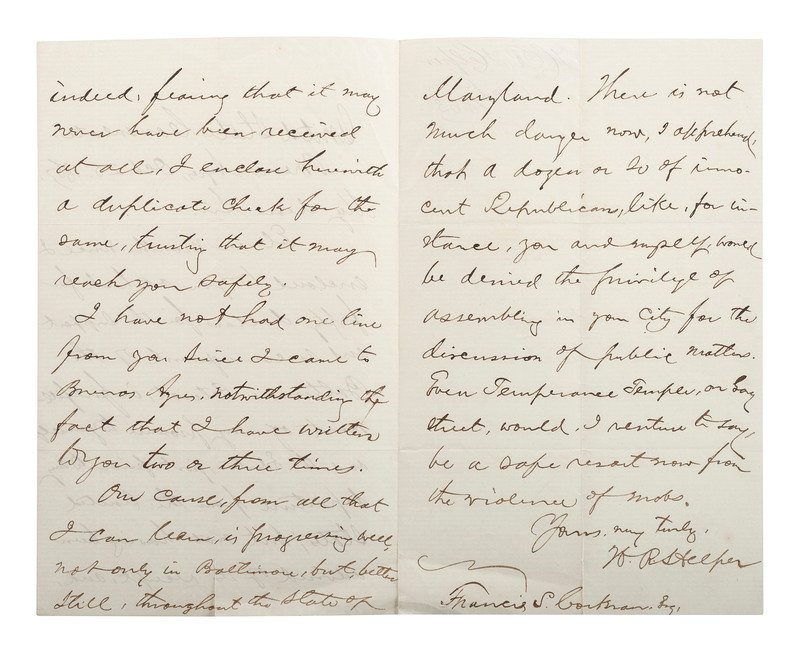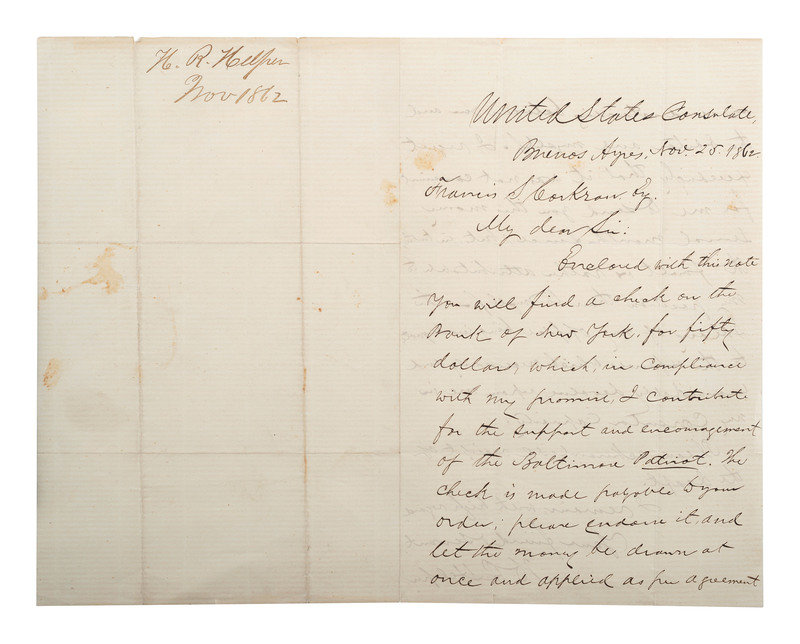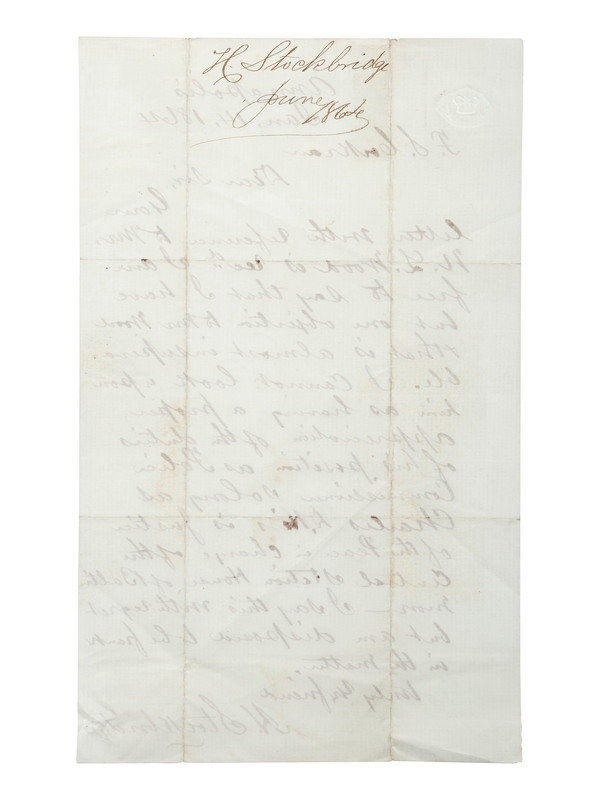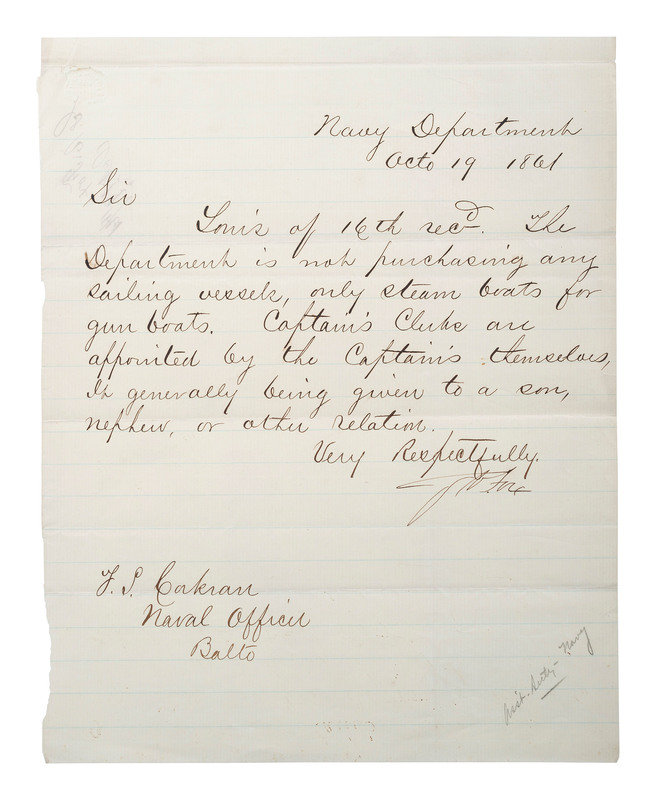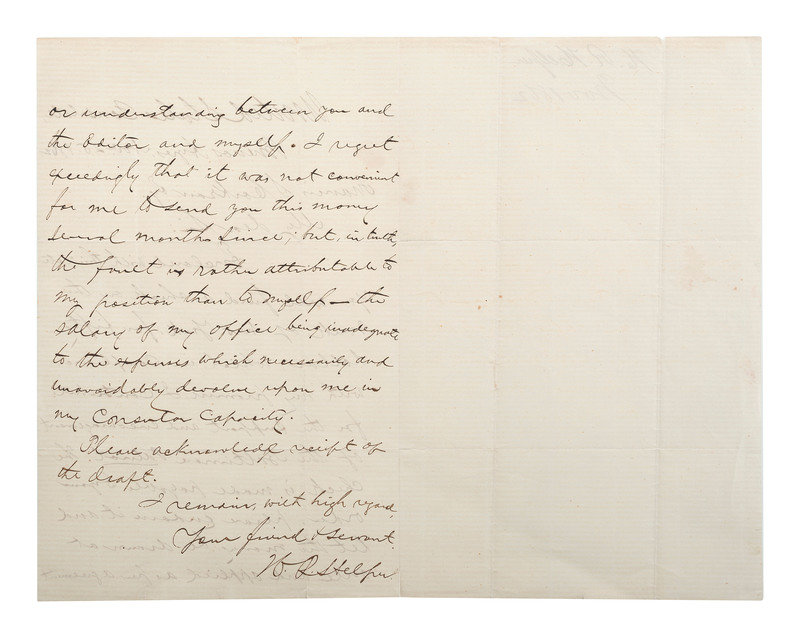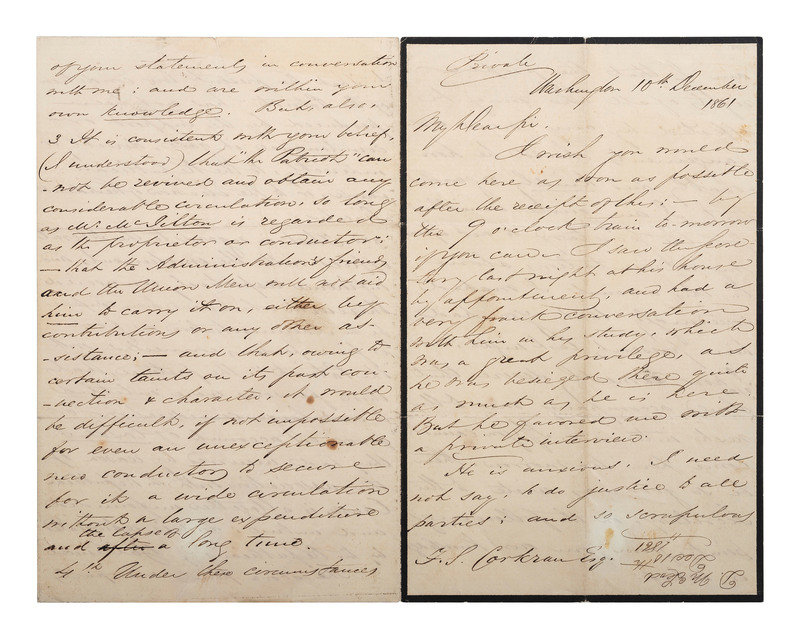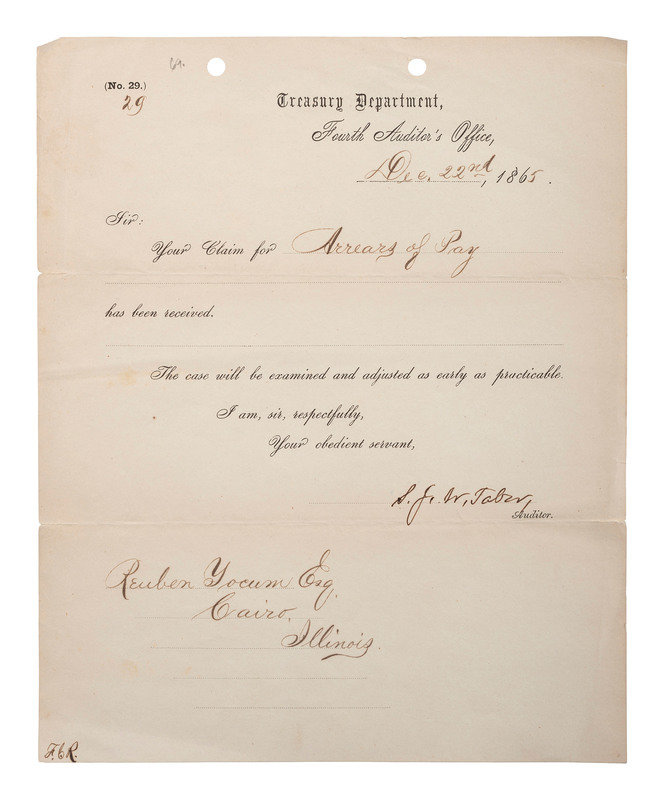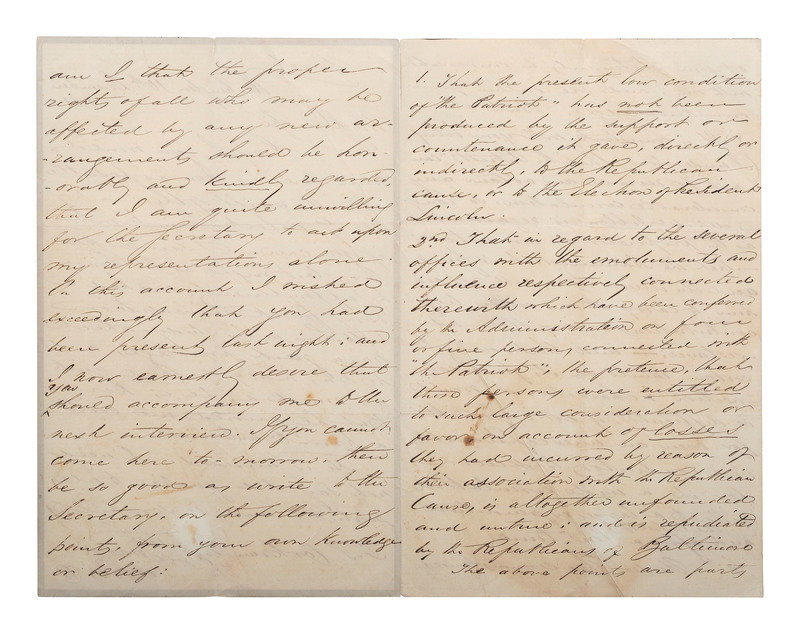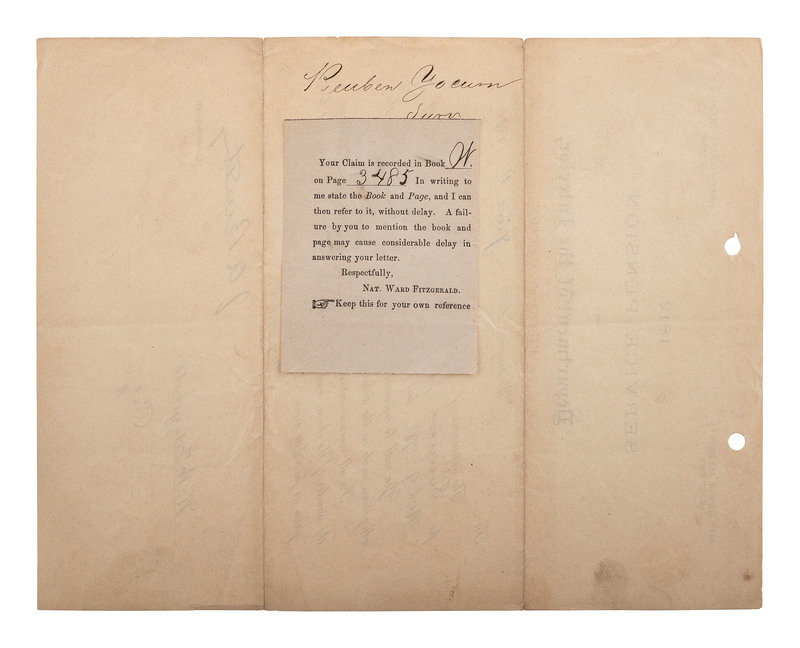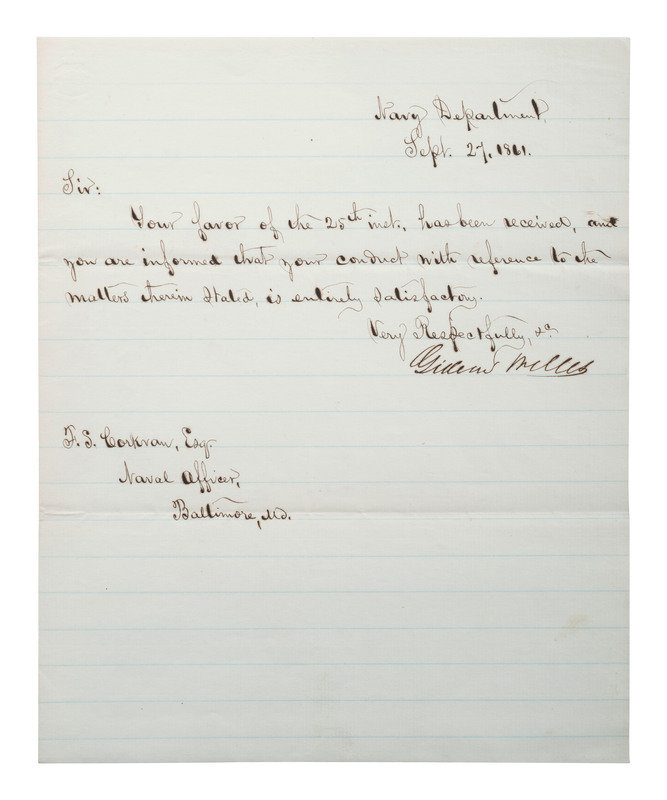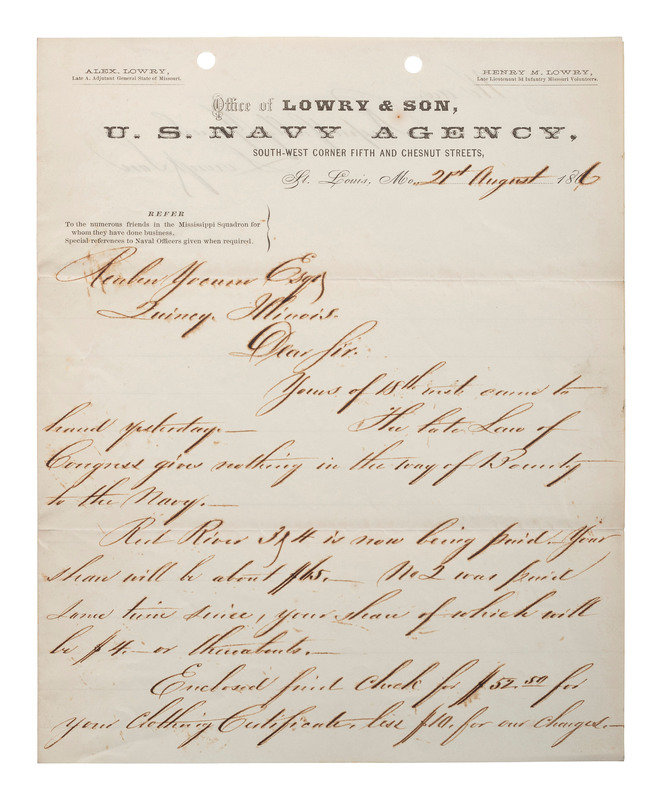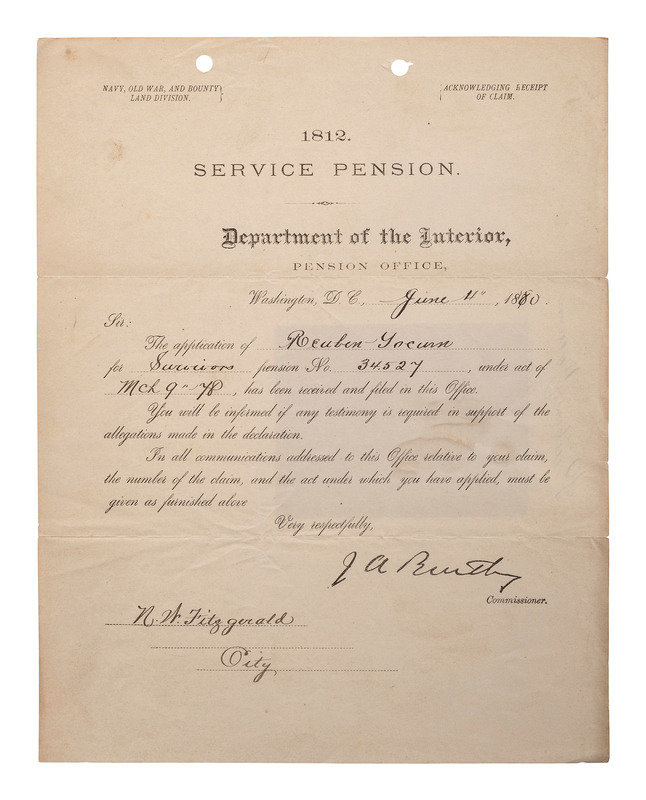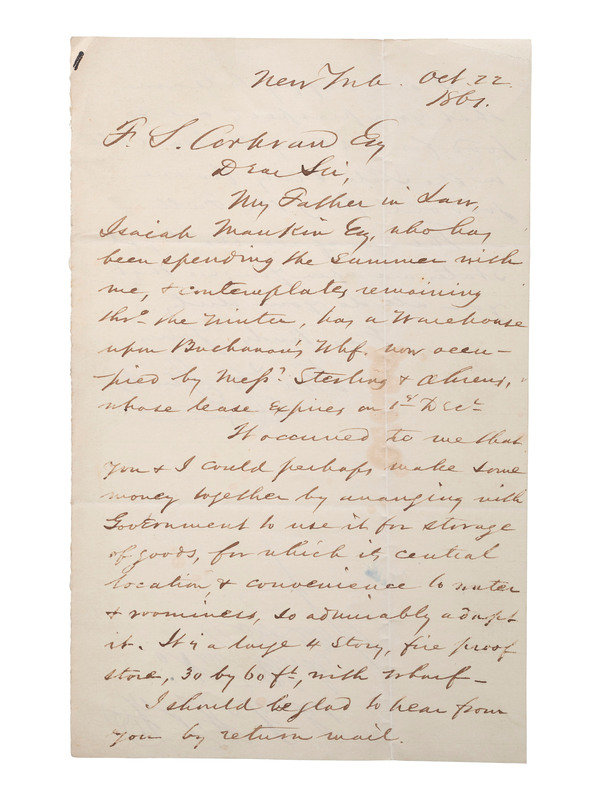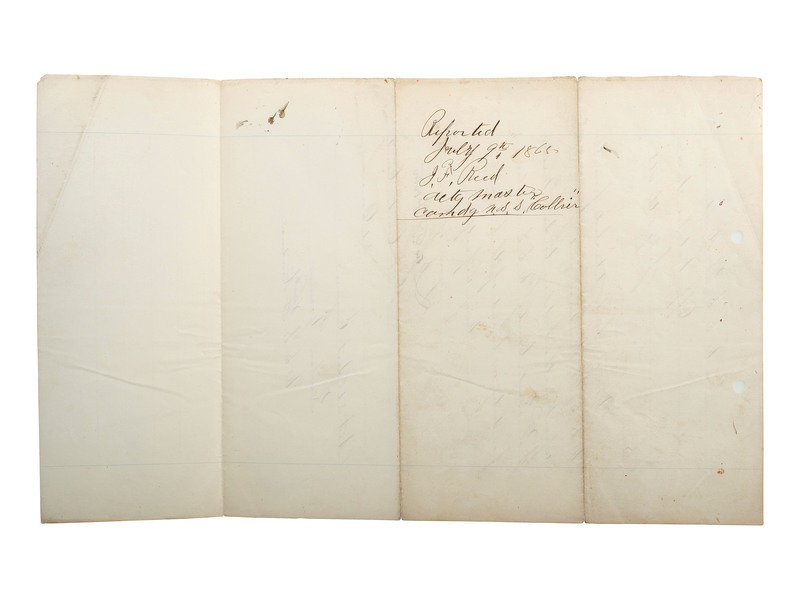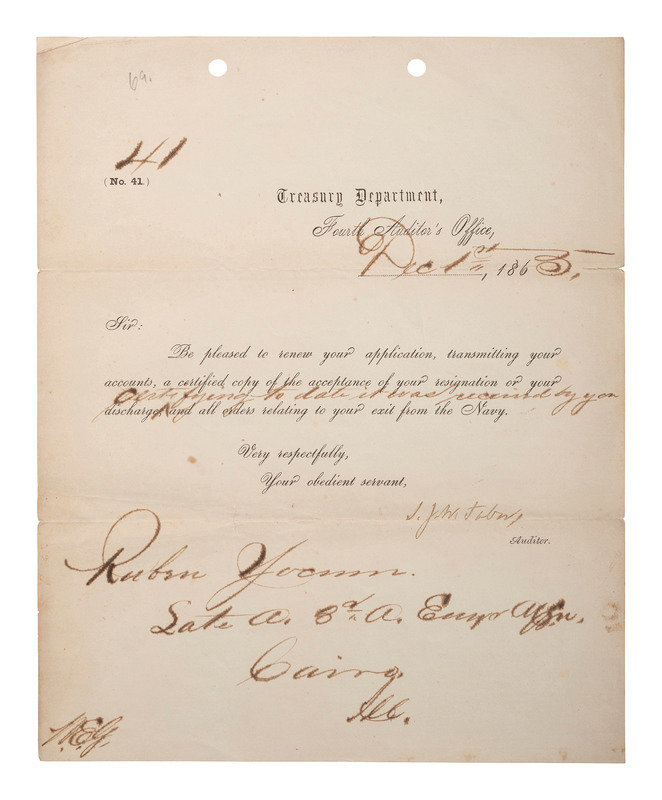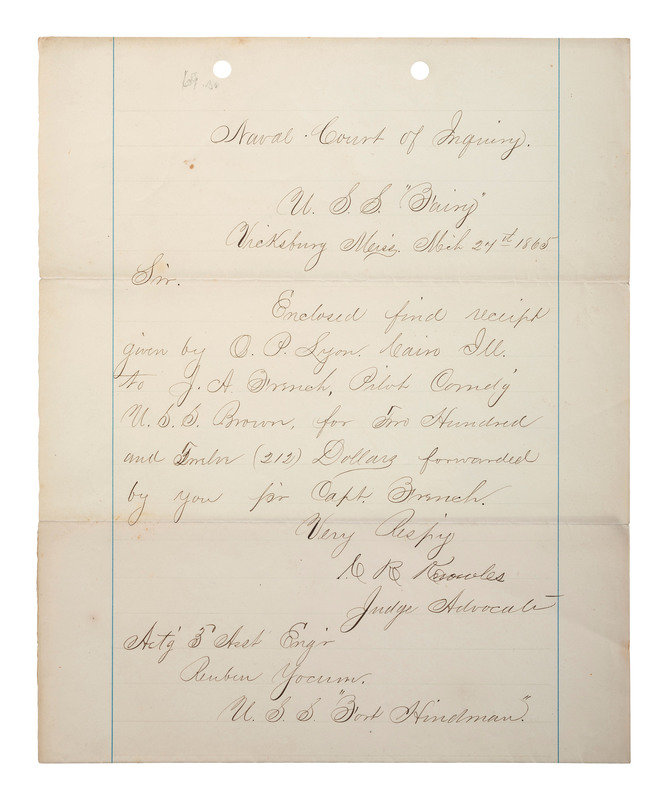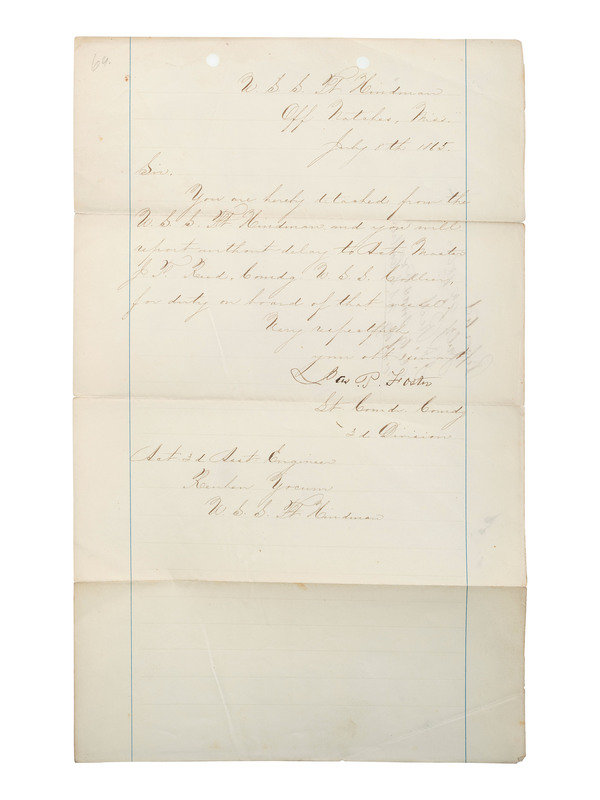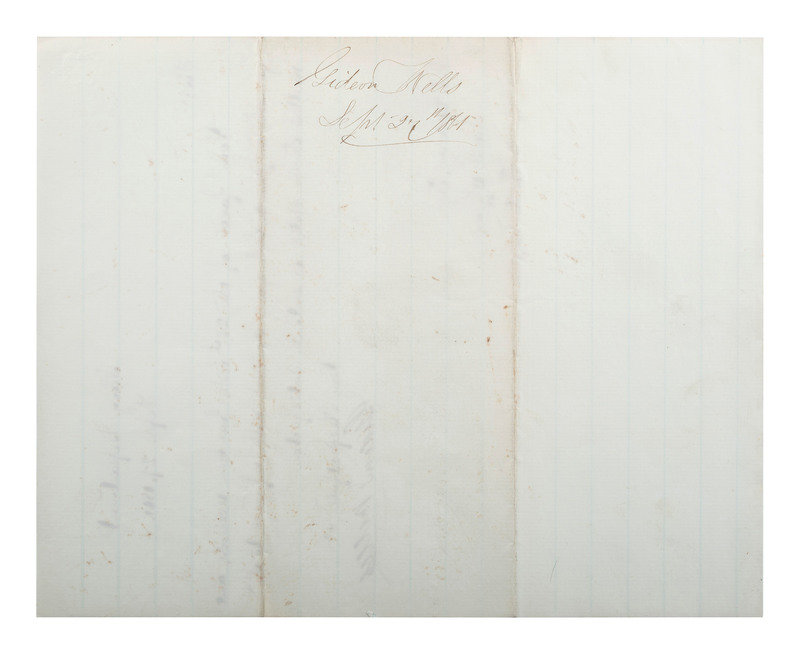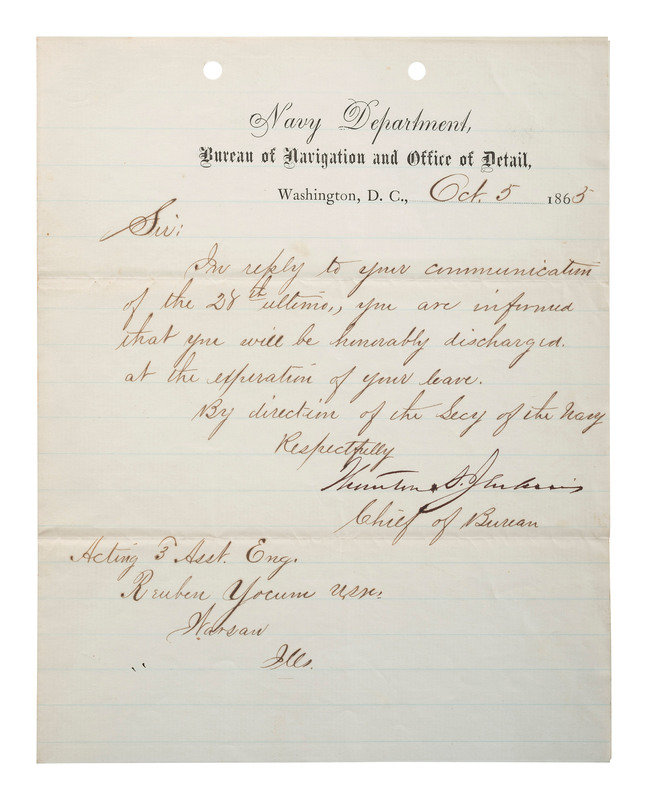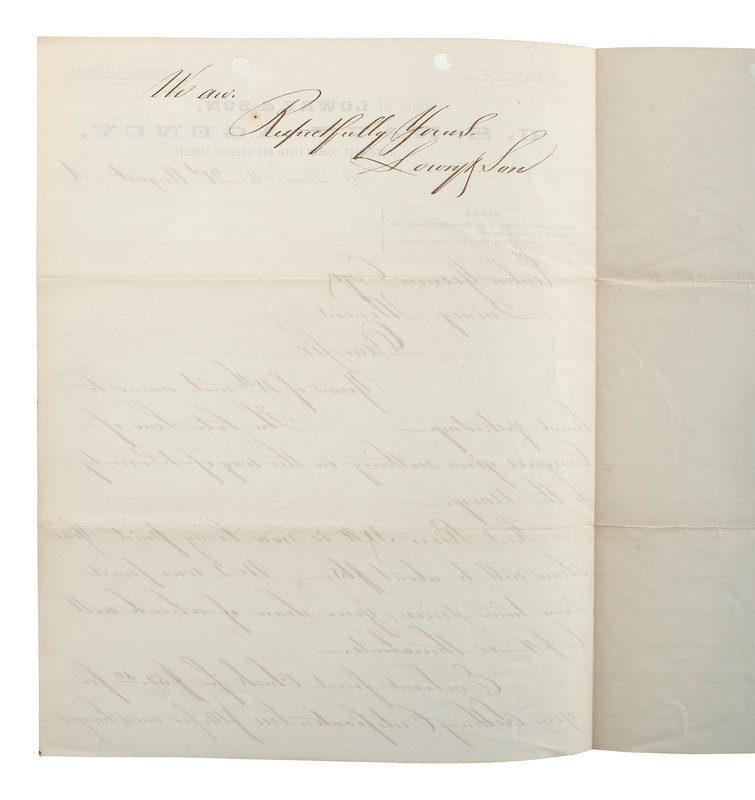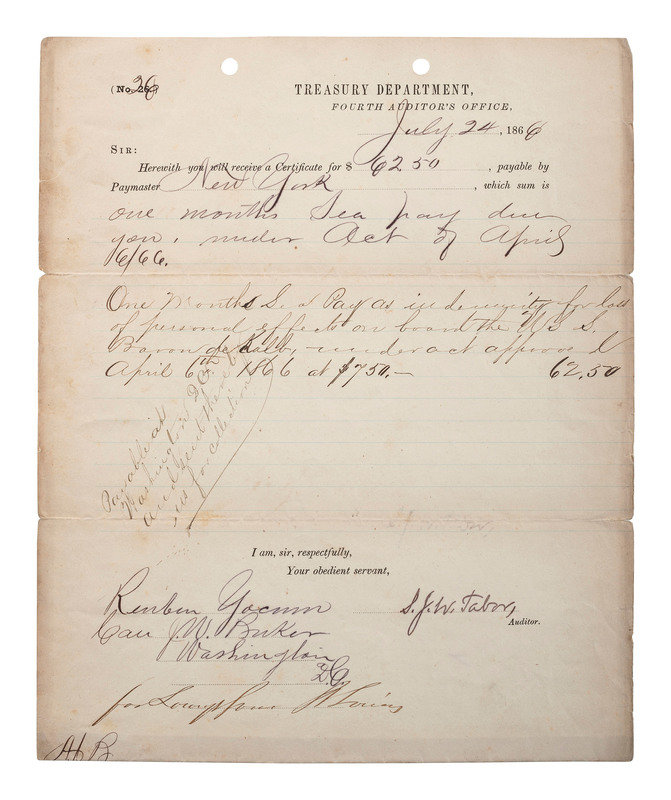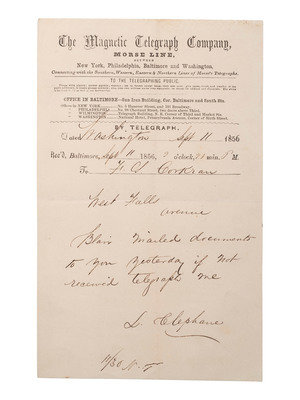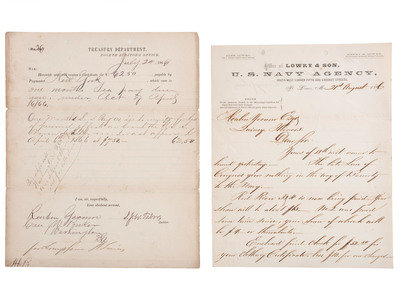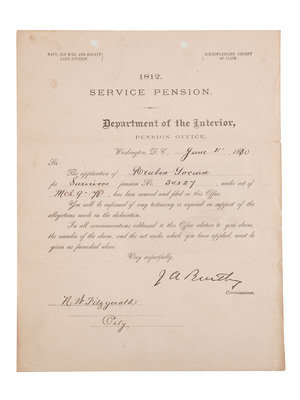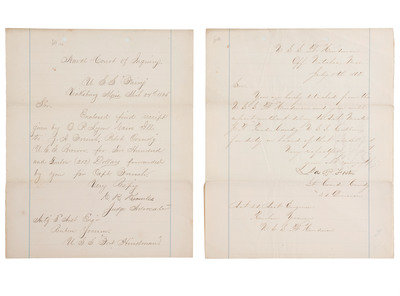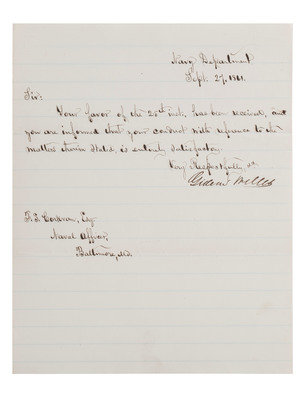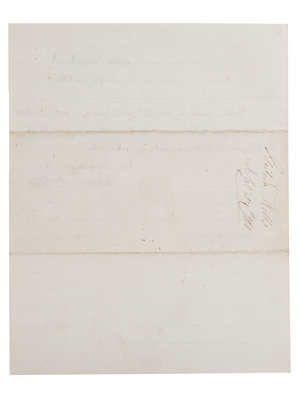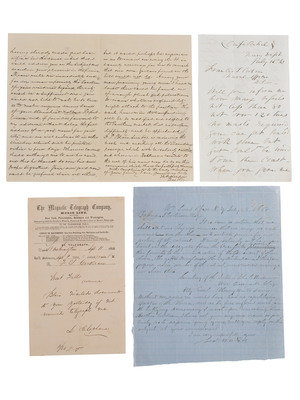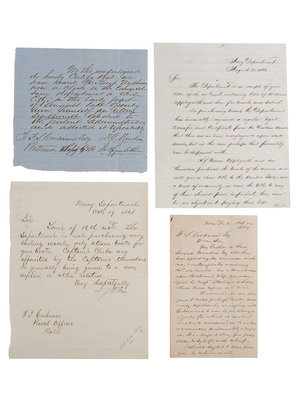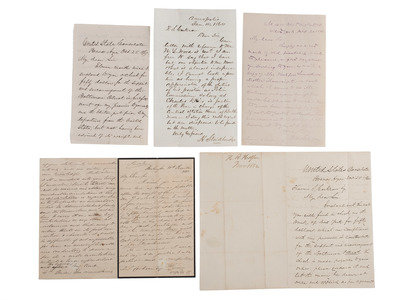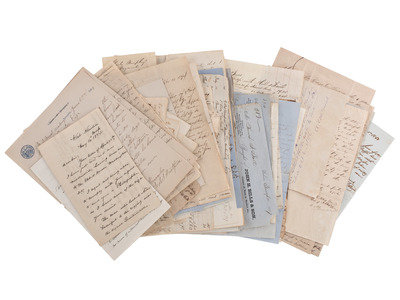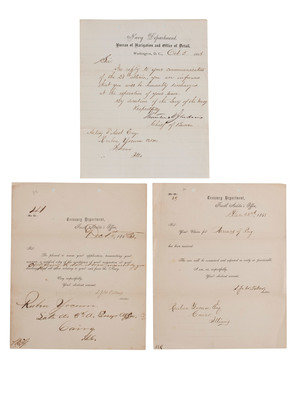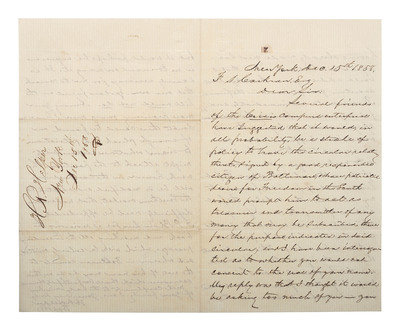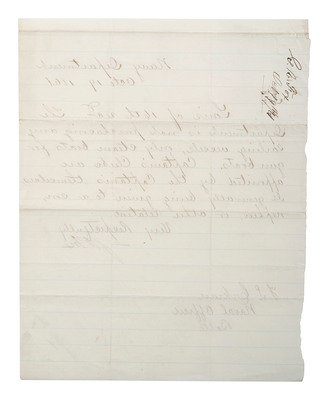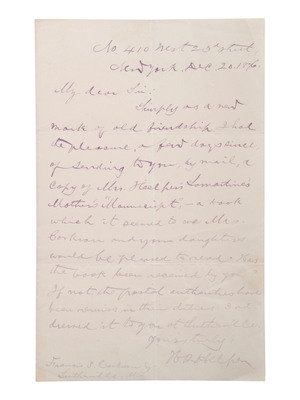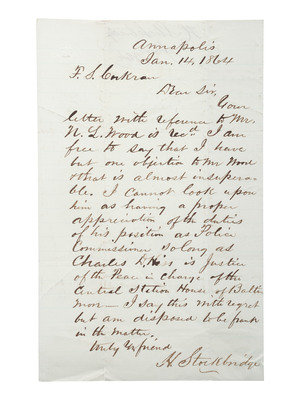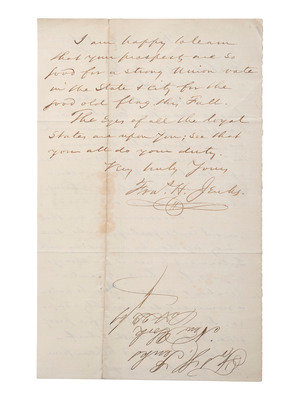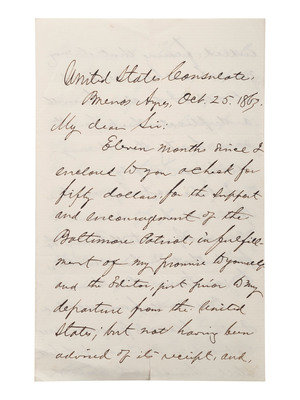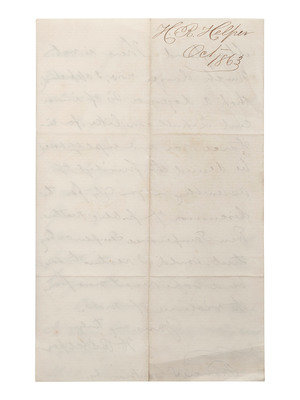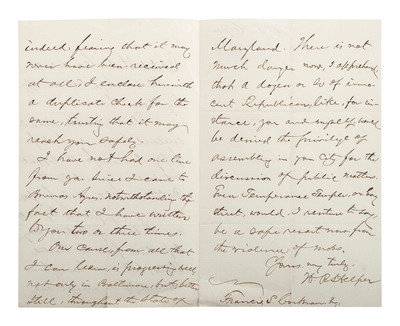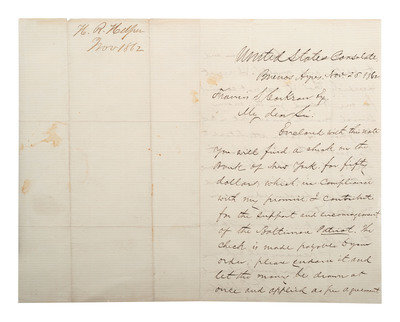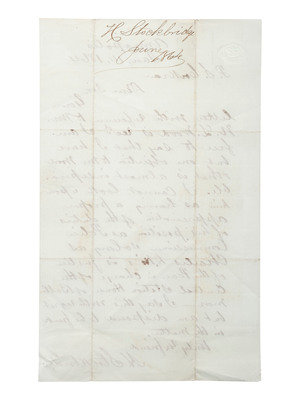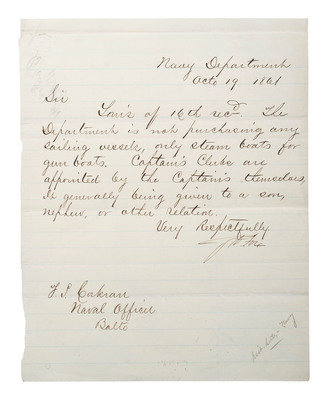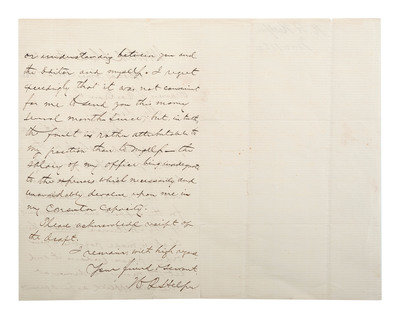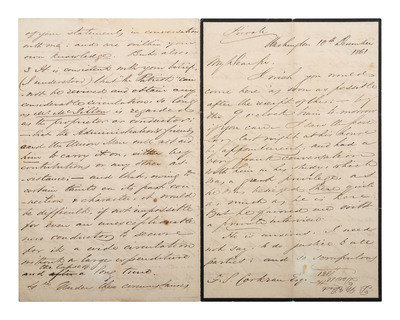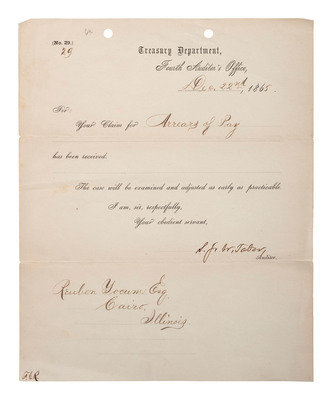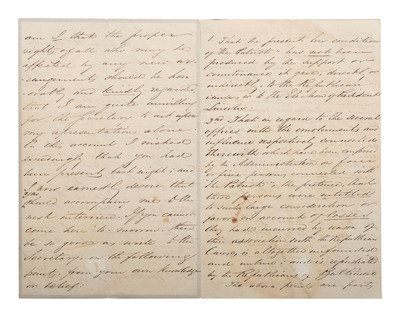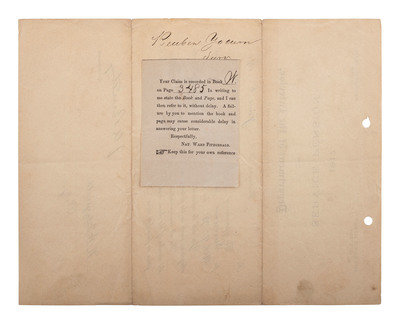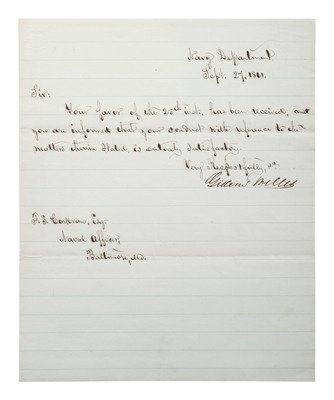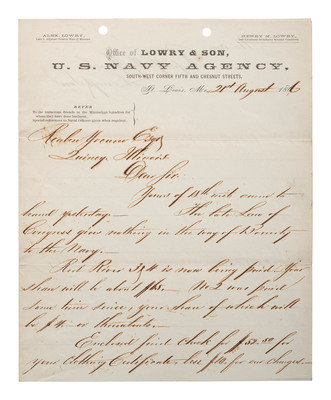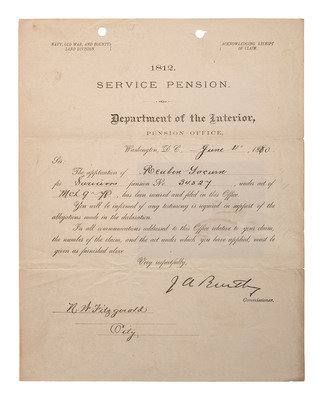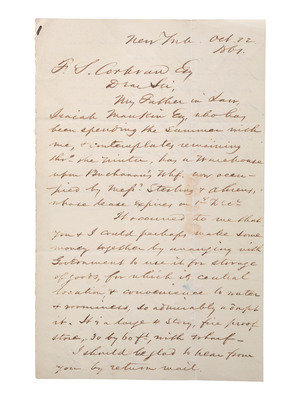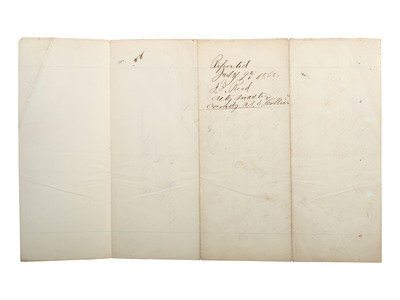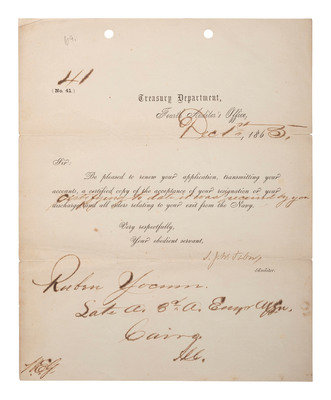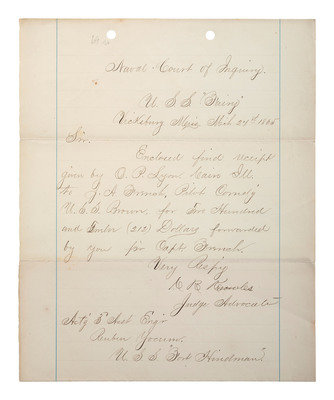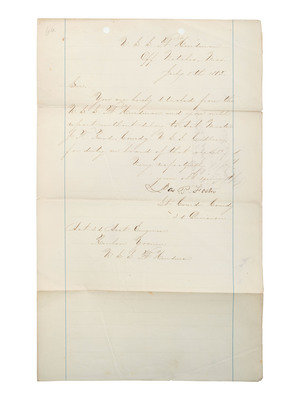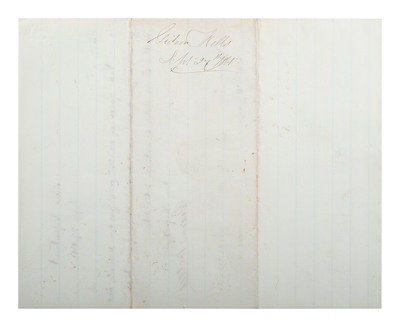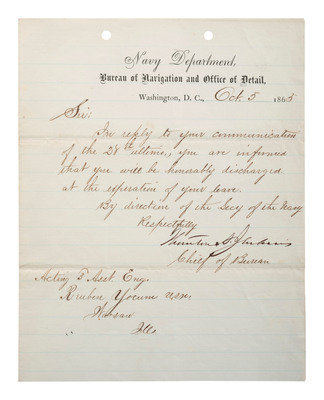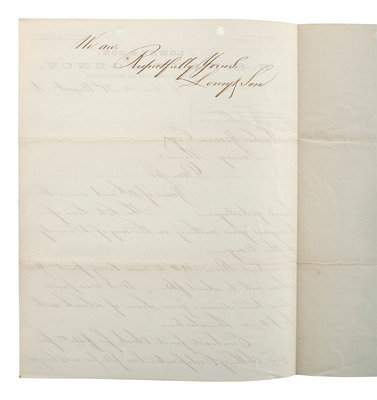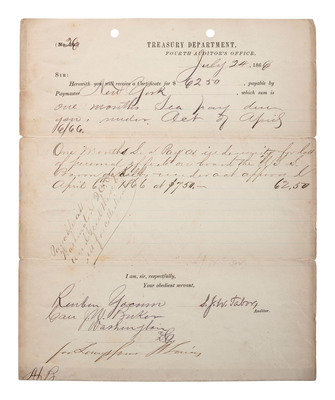Lot 59
[SLAVERY & ABOLITION] -- [COCKRAN, Francis S. (1814-1886)]. Archive of letters to Maryland abolitionist and Underground Railroad supporter, comprising:
Sale 994 - African Americana
Feb 23, 2022
11:00AM ET
Live / Cincinnati
Own a similar item?
Estimate
$500 -
1,000
Price Realized
$4,375
Sold prices are inclusive of Buyer’s Premium
Lot Description
[SLAVERY & ABOLITION] -- [COCKRAN, Francis S. (1814-1886)]. Archive of letters to Maryland abolitionist and Underground Railroad supporter, comprising:
COCKRAN, Francis (ca 1814-1886). Archive of 13 autographed letters signed to Francis Cockran (ca 1814-1886). Various places, 1856-1876.
A Maryland abolitionist and businessman active in the Underground Railroad, Cockran was an early and influential supporter of Lincoln for President. During the Civil War, he was the Navy officer in charge of the Port of Baltimore. In his Navy capacity, he served as a procurement officer for vessels to be converted for use in battle. The New York World reported on 25 February 1861, in connection with Lincoln’s welcoming reception in Washington, that “the Republican Committee of Reception from Baltimore is on the train [to Washington],” among them is Cockran, “representing the electoral college.” On 13 August 1861, Cockran purchased 22 vessels, commercial schooners used in the coal, cotton, and lumber trade between Norfolk, Richmond, Petersburg, and Baltimore. Since this trade had been outlawed by the war, these ships were available for military purposes.
Lincoln’s documented correspondence with Cockran includes a 30 September 1863 communication to Cockran: “Mrs. Lincoln is now at home and would be pleased to see you any time. If the grape time has not passed away, she would be pleased to join you in the enterprise you mention” (not included with the lot offered here). An article by William T. Kelley in the Friends Intelligencer (#55, 1989, pp. 238, 264-5, 379), includes the following: “Nearly sixty years ago, there lived in Cambridge [MD], an eminent and good man, and later on in his life Maryland’s greatest ‘Abolitionist,’ the friend and advisor, not only of the poor slave, but also to President Lincoln…His name was Francis S. Cockran…He was suspected of being an agent, and learning that his life was in danger, he left Cambridge for Baltimore, where he suffered severe persecution,--mobs, clothing torn from his back, loss of many thousands of dollars in costs, and perhaps imprisonment. Part of this was for rescuing a slave girl, but in after years it was clearly proved (as he always thought) that she had been kidnaped and was of free birth.”
CLEPHANE, Lewis (1824-1897). Autograph letter signed (“L. Clephane”). Washington D.C., 11 September 1856. 1 page, 8vo, telegram on The Magnetic Telegraph Company letterhead. A fellow abolitionist, Clephane was worked in Washington in several capacities including postmaster, with the IRS, marketing Uncle Tom’s Cabin, and an active member of the Finance Committee of the National Freedman’s Savings and Trust Company.
GITT, W. W. Autograph letter signed (“W.W. Gitt”). Virginia Land Office, New York, 28 July 1860. 1 page, 4to. Regarding the upcoming Republican National Convention, of which Gitt was a member of the Virginia delegation, he writes: “ It is now so certain that we shall elect our Chicago nominees that we may as well consult—one the other—as to suitable persons for our portion of the cabinet. It will certainly not be impertinent in the delegates from the Slave States to present their favorites to the consideration of the President of their choice. The gifted Marylander, Henry Winter Davis I therefore propose as a member of the cabinet, and would arrange our share thus: Secretary of the Interior John C. Underwood, War Mr. Cassius M. Clay, Atty Genl. Henry Winter Davis. Without Mr. Davis we would have had no Republican Speaker of the House, and as he has suffered much from the bullying democracy I insist upon rewarding him. Brother Cockran, I have not given my own views so privately as to deprive you of yours; will you reply on this subject at your convenience?” Gitt met with Lincoln in Springfield, IL, and advised him by letter thereafter. Though not mentioned in his letter to Cockran, his two leading candidates for the cabinet were Seward and Blair.
FOX, Gustavus Vasa (1821-1883). Autograph letter signed (“G.V. Fox”). Navy Department, 15 July 1861. 2 pages, 8vo, marked “(Confidential)” at letterhead. To Cockran as Naval Officer of Port of Baltimore: “Will you inform me how many vessels not less than 80 not more than 120 tuns no masts required you can get loaded with stone but yet could be towed down the Coast—when you give me this information an official letter will be addressed to you upon the subject.” On 13 October 1861, Cockran purchased 22 such vessels.
WELLES, Gideon (1802-1878). Letter signed (“Gideon Welles”). Navy Department, 28 August 1861. 3 pages, 4to. To Corkran, pursuant to his purchase of vessels for the Navy: “The Department is in receipt of your letter of the 24th inst. enclosing bills of William Applegarth and Son for vessels and ballast. In purchasing vessels the Department has invariably required a regular legal transfer, and Certificate from the Custom House [of which Corkran was in charge in Baltimore], that there are no liens, mortgages, &c. upon said vessels, but in this case perhaps that formality can be dispensed with.” The Department will pay their bill if Applegarth themselves bought the boats and can give the United States clear title, and a bond of indemnity. Based on the assumption that Corkran can clear things up, “a bill for $22,283. Has been issued in your favor.”
CORKRAN, Francis. D.G. Masters. John Higenbothom. Patterson. Document signed. [Baltimore?], [September 1861]. 1 page, 4to. Certificate to the effect that they heard one Kemp Whyshample, “a clerk in the Commissary Department in the City in the early part of August last avow himself an ultra Secessionist opposed to the present Administration and asserted it repeatedly.”
WELLES, Gideon (1802-1878). Letter signed (“Gideon Welles”), as Secretary of the Navy, to Francis S. Corkran. Navy Department, 27 September 1861. The Secretary of the Navy writes to Corkran’s inquiry: “your conduct with reference to the matters stated, is entirely satisfactory.”
FOX, Gustavus Vasa. Letter signed (“G.V. Fox.”). Navy Department, 19 October 1861. 1 page, 4to. Informing Corkran, in response to his inquiry of the 16th: “The Department is not purchasing any sailing vessels, only steam boats for gun boats. Captain’s Clerks are appointed by the Captains themselves, it generally being given to a son, nephew, or other relative.”
JENKS, Francis H. (1838-1894). Autograph letter signed (“Fra. H. Jenks”). New York, 22 October 1861. 2 pages, 8vo. Informing Corkran that his father-in-law, Isaiah Mankin, has a warehouse on Buchanan’s Wharf with a lease that expires on December 1. “It occurred to me that you & I could perhaps make some money together by arranging with Government to use it for storage of goods, for which its central location and convenience to water & roominess so admirably adapt it.”
McLEOD, D. Autograph letter signed (“D. McLeod”). Washington, 10 December 1861. 4 pp., 8vo, marked “Private,” possibly incomplete. Regarding his efforts to influence “the Secretary,” and his urgent request that Cockran accompany him on another visit to the Secretary to lend his support to the objective. If Cockran can’t catch the train to Washington in the morning, he should write to the Secretary, making specific points: (1) the “present low condition of ‘The Patriot,” isn’t the result of backing the Republican Party, or Lincoln’s election; (2) there’s no connection between the political appointment of several people associated with ‘The Patriot’ and the losses they suffered by backing the Republican cause; (3) ‘The Patriot’ can’t make a comeback as long as McTilton is the proprietor, “the Administration’s friends and the Union Men will not aid him to carry it on, and its reputation has become so tainted that only a big infusion of cash over a long period can bring it back. Text of the letter ends with the first few words of the fourth point.
STOCKBRIDGE, H. Autograph letter signed (“H. Stockbridge”). Annapolis, MD, 14 January 1864 1 page, 8vo. Declining to support the appointment of N. L. Wood to be Police Commissioner of Baltimore as long as Charles D. Hiss is Justice of the Peace in charge of the Central Station House of Baltimore.
Includes 4 autograph letters signed (“H.R. Helper”) from Hinton Rowan Helper (1829-1909): New York, 14 December 1858. 3 pages, 8vo. Trying to recruit Cockran, on behalf of the “Crisis Compend[ium] enterprise,” to lend his name to a circular as a Baltimorean and one with a “patriotic desire for Freedom in the South.” as treasurer for a fund in support of that cause. If Cockran can’t serve, can he recommend “some of your staunchest, native Republicans…” Helper, a North Carolina journalist and author, was a Southern Abolitionist, and his book, The Impending Crisis of the South: How to Meet It (1857), was intended to advance Lincoln’s Presidential prospects. -- United States Consulate, Buenos Aires, Argentina, 25 November, 1862. 2 pp., 8vo. Enclosing a check [not present] “for support of the Baltimore Patriot.” -- United States Consulate, Buenos Aires, Argentina, 25 October 1863. 3 pp., 8vo. Inquiring at tiresome length about whether his contribution to The Patriot has been cashed. Just in case, he encloses a duplicate [not present]. “There is not much danger now, I apprehend, that a dozen or so of innocent Republicans, like, for instance, you and myself, would be denied the privilege of assembling in your city for the discussion of public matters. Even the Temperance Temper, on Long Street, would, I venture to say, be a safe resort from the violence of mobs.” Some years earlier, Corkran had been attacked by a mob, having been inaccurately accused of helping an enslaved woman escape. -- New York, 20 December 1876. 1 page, 8vo. Reminding Corkran that he sent a copy of “Mrs. Helper’s Lamartine’s Mother’s ‘Manuscript,’” for Mrs. Corkran and their daughters.
[With:] Archive of 8 documents related to Reuben Yocum, 3rd Assistant Engineer on the U.S.S. Fort Hindman, among others, including bounty payments and other financial documents: FOSTER. Autograph letter signed, to Yocum. U.S.S. Fort Hindman, off Natchez, MS, 8 July 1865. Orders to Yocum detaching him from the Fort Hindman and directing him to report to Acting Master J. F. Reed, Comdg. the USS Collier. -- JENKINS, Newton S. Letter signed, to Yocum. Washington D.C., 5 October 1865. On Navy Department, Bureau of Navigation and Office of Detail letterhead. A letter informing Yocum that “you will be honorably discharged at the expiration of your leave.” -- Form No. 26. Treasury Department, Fourth Auditor’s Office, 24 July 1866. Partly-printed document completed in manuscript. Yocum is awarded $62.50 in back pay for “one month’s sea pay” and for “personal effects aboard the U.S.S. Baron DeKalb.” She participated actively in the capture of Forts Henry and Donelson and participated in the attack on Fort Pillow. On 13 July 1863 she was sunk by a "torpedo" [i.e., mine] in the Yazoo River, one mile below Yazoo City, MS. Yocum probably lost his personal possessions on this occasion. --LOWRY & SON. Autograph letter signed to Yocum. St. Louis, MO, 21 August 1866. On Office of Lowry & Son, U.S. Navy Agency letterhead. “The late Law of Congress gives nothing in the way of Bounty to the Navy. Red River [indecipherable] is now being paid. Your share will be about $65. No. 2 was paid some time since, your share of which will be $4. Enclosed find check for $52.50 for your clothing certificate less $10 for our charges.” -- 1812. Service Pension. Washington, D.C., 4 June 1880. Partly-printed document completed in manuscript acknowledging Yocum’s pension claim, Pension No. 34527. – And 3 others. Together, 8 documents, 4to, condition generally good, toning, old creases, occasional small tears.
[Also with:] BILLS, John Houston. and Leonidas Bills. A small archive, approximately 72 pieces, of miscellaneous business records and correspondence relative to a family business located in Bolivar, TN, 1845-1901. Includes a document signed by Francis Cockran. Other documents from John Houston Bills, a friend of James K. Polk is held at the Southern Historical Collection at the Louis Round Wilson Special Collections Library and University of North Carolina at Chapel Hill.
The Richard B. Cohen Civil War Collection
Condition Report
Contact Information
Auction Specialist
